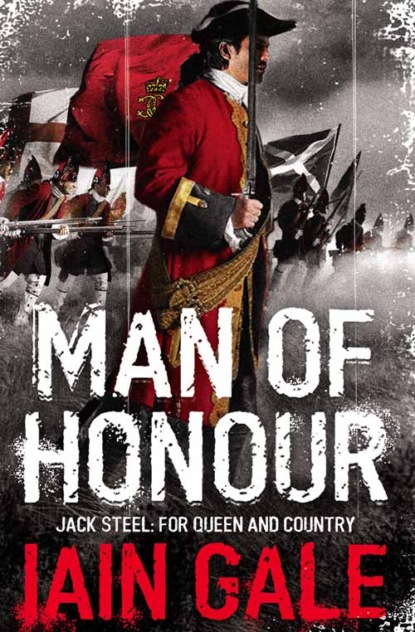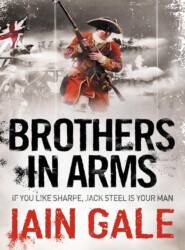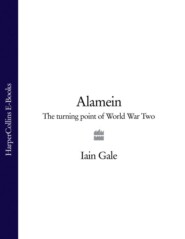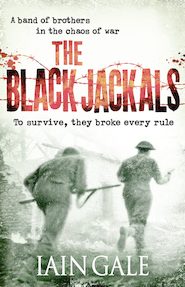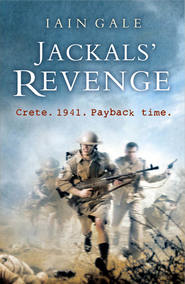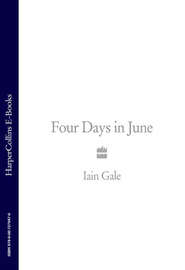По всем вопросам обращайтесь на: info@litportal.ru
(©) 2003-2024.
✖
Jack Steel Adventure Series Books 1-3: Man of Honour, Rules of War, Brothers in Arms
Автор
Год написания книги
2018
Настройки чтения
Размер шрифта
Высота строк
Поля
Then, almost as an afterthought, he added:
‘And remember. As far as we know the inn is still standing.’
Slaughter smiled. He said nothing, but began to walk with a new spring in his step.
‘The men seem dispirited, Jacob. I am not wrong?’
‘Never more true, Sir. There’s talk at all times of what they’re doing down here now and you know as well as I do, Mister Steel, that when a soldier lets those words cross his lips then them other thoughts cannot be far away.’
‘Cussiter?’
‘Oh, the lad’ll be fine, Sir. But it’s not just him as is grumbling.’
Slaughter paused, thoughtfully.
‘Best to stop here, as you say, Sir. And, just so you know, I’m keeping Dan Cussiter as far away as I can from our friend the Major. If you know what I mean. Bit of bad luck Jennings being the other officer to come with us. If you don’t mind my saying so.’
‘No, Jacob. I don’t mind you saying that at all.’
The crash of the men’s boots echoed on the dry, soot-stained cobbles and resounded through the empty streets. There was no other sound save the rattle of equipment and the trundle of the wagons as the column slid noisily into the town.
There were no dogs barking here, nor even any birdsong. The smell of burning timber hung heavy on the air.
It was the height of the morning now, a sunny summer day, when normally the street would have been alive with noise as tradesmen and townspeople went about their business. Today, though, Kirchenstrasse stood empty, the tall, proud houses that had lined its sides no more than burnt-out, smoking ruins, like the stumps of so many blackened, rotten teeth. In places the fires still smouldered, the embers a mocking reminder of the vanished comfort of their hearths.
Possessions lay littered across the cobbles where they had been abandoned or forgotten in the headlong rush of a populace eager to escape further horrors. Clothes, shoes and bags lay everywhere. Dolls and other toys, scorched and filthy, along with larger items. Chairs, wooden boxes, musical instruments. Naturally, anything of particular value left behind by the townspeople had been taken by the Dutch. There were a few exceptions. A gilt-framed painting of Christ in Majesty lay in a gutter and a grandfather clock stood incongruously in the centre of the road junction, where its owners, having tried desperately to save their most precious possession, had been forced to leave it. Books lay strewn around and everywhere sheaves of paper blew through the deserted streets.
At length they came in view of the church. As the first building that they had seen in the place that had not been reduced to cinders, it stunned them with its simple majesty. Rounding the corner and entering the square, where the church façade rose high against the brilliant blue of the sky, Steel saw that close to the basilica stood another building. The inn was indeed still there, just as the Dutch Captain had told him. With its gaily painted timberwork and bright blue gilly flowers growing in pots, it made a grotesque contrast with the devastation that lay all around it.
‘Sarn’t, I think we’ll stop here.’
Slaughter turned his head to the right:
‘Column, halt.’
‘Stand the men easy, Sarn’t Slaughter. Allow them fifteen minutes rest.’
Williams rode up, and with him Jennings. The Major seemed indignant:
‘Mister Steel. We have stopped. Tell me why?’
‘Why, Sir. Because this is our bivouac for the night.’
‘The night, Steel? But it is barely three o’clock of the afternoon. We surely have two more hours to march?’
‘The men, Major, need to stop. And this is as good a place as any. Indeed it is better, on many counts. And it has an inn.’
Jennings looked across the street where a painted sign with a running grey horse hung above the inn door.
‘Well, Steel. If you are convinced. Although I don’t suppose for a moment that they’ll have anything half decent.’
He turned to face the column.
‘Sarn’t Stringer. Where the devil is the oaf? Stringer. My bag.’
Jennings dismounted and strode across the square, followed by the ever-attendant Stringer, who had retrieved Jennings’ bag from the coach.
Steel called after him:
‘Oh, Major. There’s a landlord who’s old and sick and his daughter. Look out for them.’
He glanced at Slaughter.
‘I do hope that the Major finds the accommodation to his liking. Come on, Sarn’t, we’d best get this lot sorted for the night. We’ll leave the wagons here on the street. There’ll be no traffic through here in the next few hours. Oh, and Jacob.’
‘Sir.’
‘Find the men somewhere to sleep. There’s what looks a likely field over there, behind the church. Tell the Grenadiers they might have two flagons of ale apiece in the inn – if it’s to be had at all. Tell them I … tell them Lord Marlborough will stand the cost.’
‘Very good, Sir.’
‘Oh, and Jacob. Just so that you know, I shall be joining you out in the field. Jennings is in the inn – with his monkey – and nothing on earth could possibly persuade me to sleep under the same roof.’
Across the town square, Jennings pushed open the door of the inn and stepped inside, closely followed by his Sergeant. Rather than the dirty wine glasses and half-empty tankards of ale that he had expected to find still on the tables where the last customers might have left them, he was surprised to find the interior neat and tidy. The parlour was deserted, although a fire had been laid in the grate and a pile of plates stood on a dresser, ready to be set.
‘Hallo. Anyone? Hallo.’
A door opened at the back of the room and a girl walked in. Jennings knew real beauty when he saw it and it took only a moment for him to decide that by whatever means, before they left this place, he was going to seduce her.
She addressed him in the local dialect.
‘Good day. Oh. You are a soldier?’
‘Yes, English, Miss. Major Aubrey Jennings, Farquharson’s Regiment, at your service.’
He gave a low bow and removed his hat.
‘You are English? Then I speak to you in English.’
Her voice was wonderfully gentle. A sweet contrast to the harsh, masculine world he had just left outside. Her words though were bitter.
‘Tell me, Sir. Why should I trust the English? Your men come here and burn our town. Why? What have we done? We do not make war on you. Why? Why?’
Jennings, taken aback, said nothing. Then a thought entered his mind. Quite brilliant. ‘Dear Miss, excuse me, you have me at a disadvantage. I do not have your name, Miss …’
‘Weber. My name is Louisa Weber and this is my father’s inn.’
‘Dear Miss Weber. I have come to apologize. On behalf of his Grace the Duke of Marlborough, I offer you and your fellow townspeople his Grace’s most sincere apologies. We encountered some of your friends on our way here and have attempted to recompense them for any damage that has been done. Obviously the village is beyond redemption, but we must do what we can. I beseech you to believe me, on my honour as a soldier and a gentleman that this was no doing of the English. It was the action of our Dutch allies and will be punished with the death of those responsible.’





